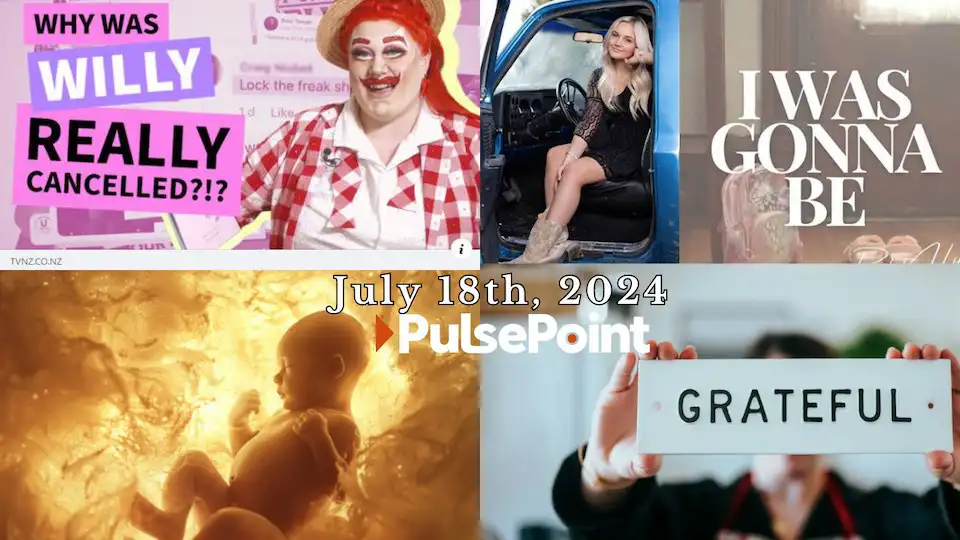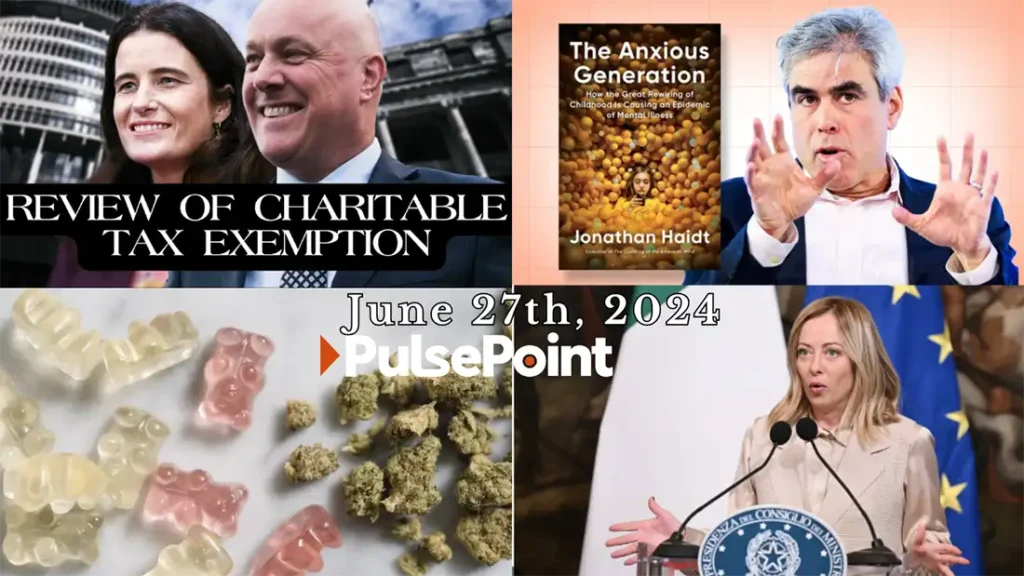Welcome to Episode 6 of PulsePoint – the latest media stories and research related to family and society that you need to know about – issues from both New Zealand and overseas that the Family First team have been monitoring and researching over the last week. It’s time to cut through the spin and uncover the real issues.
On this episode of PulsePoint:
1. NZ Prime Minister Chris Luxon is considering the possibility of taxing churches.
2. The Ministry of Health is reviewing the use of puberty blockers on kiwi children.
3. A new survey shows adults are feeling lonelier.
4. A French priest faces legal action after saying “homosexuality is a sin”.
5. Finally, mark your diary for the Forum on the Family in July.
You can check out all these stories and more on our website FamilyFirst.nz. We’ll keep watching the news… so that you don’t have to.
TRANSCRIPT:
In this episode of PulsePoint, we’ll update you on these topics:
- CHURCHES & OTHER religious groups MAY be a target for stripping away tax benefits
- This week the Ministry of Health is releasing a review of the use of puberty blockers on kiwi children.
- The Lonely crowd.
- Raffray’s reference to homosexuality as a “weakness” to be overcome may violate the French ban on so called “conversion therapy”.
- Finally,
Intro: Welcome to PulsePoint – the LATEST media stories AND research related to family and society that YOU need to know about from both New Zealand AND overseas. Let’s cut through the spin and uncover the REAL issues.
I’m Tumby Stowers.
*#
1.As we previously reported on PulsePoint, in the Briefing to the Incoming Minister for the Community and Voluntary Sector from the Department for Internal Affairs after last year’s election and change of government, it said:
Issues that stakeholders want reviewed include fundamental matters such as CHARITABLE PURPOSE (for example, should the advancement of RELIGION still be a charitable purpose with associated tax benefits) and advocacy by charities.
That paragraph, in a government briefing, is VERY concerning. The fact that the Department of Internal Affairs has even SUGGESTED this, indicates that the charitable status of CHURCHES & OTHER religious groups MAY be a target for stripping away tax benefits – despite the fact that 80% of charitable work in NZ is done by faith-based organisations.
And according to the Government, the value of THAT work is at least $6 billion dollars each year. 157 million hours of volunteer work.
But last week, the media – completely out of the blue and with no real current context or issue directly leading to the question – started to exert some more lobbying pressure to target churches.
They asked the Prime Minister about taxing churches.
VIDEO – taxing churches edited nz herald
It is very concerning that this agenda is not only coming from a Briefing Paper, but now from the Prime Minister.
The Mayor of Auckland Wayne Brown has already indicated the same target with rates – this was almost three weeks ago
VIDEO – wayne brown taxing churches newhub
It is vital that church leaders ensure that the new Minister for Community and Voluntary Sector Louise Upston and also Brooke van Velden who oversees the Department of Internal Affairs receive a STRONG message that faith & religion IS charitable, benefits society to the good, and should be supported because of the significant financial value it gifts the country from its volunteer and community work.
*#
2. IMAGE – cass report cover
A landmark report released [last week] by pediatrician Dr. Hilary Cass is the result of a major independent review on children and gender identity commissioned by the NHS in 2020. Dr Cass is a former president of the Royal College of Paediatrics and Child Health.
Here’s some of the key conclusions
IMAGE
Puberty blockers should no longer be prescribed to children except in the context of research due to these powerful drugs’ effects on brain development and bone health
IMAGE
Cross-sex hormones — estrogen and testosterone — should be prescribed to trans-identifying 16 and 17-year-olds only with an “extremely cautious” approach, and there should be a “clear clinical rationale” for not waiting until the teen is 18
And in one of the interviews with Dr Cass, she talks about the accompanying mental disorders that include the gender confusion – and also the effect of social media encouraging the confusion
VIDEO – mental health – hilary cass children being let down _edited
She concluded:
IMAGE
“Biology hasn’t changed in the last few years so it’s not that that’s changed things … we do have to think very seriously about the impact of social media, not just in terms of influencers, but about the effect of long hours on social media.”
IMAGE
For most young people, a medical pathway, i.e. a medical transition, will not be the best way to manage their gender-related distress. Even for young people where a medical pathway is clinically suggested, it isn’t enough and does not negate the need to address wider mental health and psychosocial challenges.
IMAGE
Young people facing gender-related distress had no significantly different levels of suicide risk to other young people with similar levels of complex presentations.
No evidence that gender-affirming treatment reduces suicide risk.
The NHS released a statement saying it will review all transgender treatment it provides, including to adults, and all new treatment for 16 and 17-year-olds will be paused immediately. In fact, all minors.
This week the Ministry of Health is releasing a review of the use of puberty blockers on kiwi children.
New Zealand has been practicing conversion therapy on our children. It’s called transgender affirmation treatment. Confusion, chemicalisation & castration.
It’s time to stop this atrocious social experiment on our young people.
You can watch a more indepth analysis on McBlog on our website familyfirst.nz
*#
3. According to a recent poll on 2000 British adults, the epidemic of loneliness is not just confined to Gen-Z or millennials.
The market research poll, commissioned by Zumba found that 40% of adults had gone at least three days without face-to-face interaction with another person.
Of the cohort, a quarter felt isolated at their workplaces, and 28% reported feeling lonely at social events. Women and individuals between the ages of 18-24 were more likely to report feelings of loneliness.
The poll found the toll of loneliness negatively impacted a person’s confidence, anxiety levels and sleep. Feelings of disconnectedness from others or quality relationships had an adverse toll on a person’s physical and mental well-being.
Interestingly, other findings also found that bonding through shared experiences and being a part of a group, community or collective working towards a goal could help alleviate loneliness. In our digital age of hyper-connectedness, findings from this recent poll remind us that remaining connected offline and in person is still a vital part of our humanity.
*#
4. The French government is targeting a Catholic priest for calling homosexuality a “weakness” and declaring that homosexual acts and relationships are sinful.
A catholic Prierst by the name of Matthieu Raffray, posted a video to social media last month encouraging Christians to fight against their sins, which he says are forms of “weakness.” Among the sins Raffray named was homosexuality. He preached, “We all have weaknesses: those who are greedy, those who are angry, and those who have homosexual tendencies!”
The priest faced immediate backlash from LGBTQ activists and French Minister for Gender Equality and Fight Against Discrimination Aurore Bergé called Raffray’s preaching “unbearable.”
Raffray’s reference to homosexuality as a “weakness” to be overcome may violate the French ban on so called “conversion therapy”.
Raffrays predicament serves as a microcosm to the threat of Christian religious freedom in the west, even here in New Zealand. Our government has also enshrined in law anti-gay conversion therapy laws that are overreaching, incoherent and a violation of religious freedom.
The NZ church is in many ways at an impasse; will churches in New Zealand publically affirm their sexual ethics or will they succumb to governmental pressure and be silent? Time will tell.



